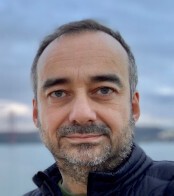Nature Aging is edited by in-house professional editors.
Nature Communications is edited by in-house professional editors.
Communications Biology is edited by both in-house professional editors and Editorial Board Members.
Communications Medicine is edited by both in-house professional editors and Editorial Board Members.
npj Aging is managed by in-house professional editors and edited by a team of external academic editors.
Scientific Reports is managed by in-house professional editors and edited by Editorial Board Members. For this Collection, Natalie R Gassman, Miguel Godinho Ferreira, Cyrus Khandanpour and members of the Editorial Board will handle submissions to Scientific Reports. Manuel Collado will handle submissions to npj Aging.
Our editors work closely together to ensure the quality of our published papers and consistency in author experience.
Guest Editors for npj Aging
 Manuel Collado, PhDCNB (CSIC), CIMUS (USC), and IDIS
Manuel Collado, PhDCNB (CSIC), CIMUS (USC), and IDIS
Univeristy of Santiago de Compostela, Spain
Manuel Collado is a Research Scientist of CSIC and Group Leader at CIMUS (University of Santiago de Compostela, USC) in Santiago de Compostela, Spain. His research focuses on the study of cellular senescence and its involvement in physiological and pathological processes.
Guest Editors for Scientific Reports

Natalie R. Gassman, PhD
University of Alabama at Birmingham, USA
Natalie R. Gassman is an Associate Professor in the Department of Pharmacology and Toxicology, Heersink School of Medicine, University of Alabama at Birmingham, USA. Her research focuses on DNA repair modulation during environmental exposures and cancer. Dr Gassman has been an Editorial Board Member for Scientific Reports since 2023.
 Miguel Godinho Ferreira, PhD
Miguel Godinho Ferreira, PhD
Institute for Research on Cancer and Aging of Nice, France
Miguel Godinho Ferreira is a Director de Recherche with the CNRS and Team Leader at the Institute for Research on Cancer and Aging of Nice, France. His base hypothesis suggests that telomere dysfunction signals a cascade of events that triggers organism aging and age-associated diseases, namely, cancer. Dr Godinho Ferreira has been an Editorial Board Member for Scientific Reports since 2011.
 Cyrus Khandanpour, PhD, MD
Cyrus Khandanpour, PhD, MD
University of Lübeck, Germany
Cyrus Khandanpour is a Professor at University of Lübeck for Translational Cancer Research and Co-director of the University Cancer Center Schleswig-Holstein, Germany. His research and clinical work focuses on translational research and precision oncology with a focus on early Phase I trials. Professor Khandanpour has been an Editorial Board Member for Scientific Reports since 2019.

